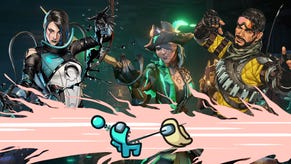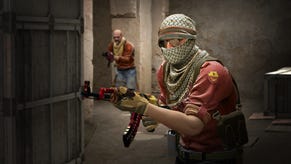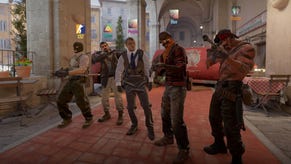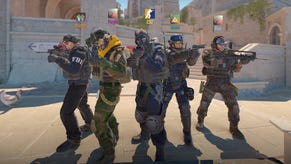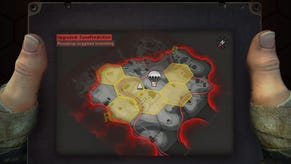Supporting Counter-Strike’s Professional Women
Pop Flash
In Pop Flash, a series of insights into Counter-Strike: Global Offensive [official site], Emily Richardson looks past the amazing clutches and crushing defeats to understand the culture and meta of Valve’s everlasting competitive FPS.
In comparison to some other games, Counter-Strike is doing pretty well with regard to its female pro scene. The situation is far from perfect - there are still issues both at the professional and amateur levels, and we definitely want more women competing, but there are some extremely talented women playing CSGO professionally. So I’m interested to learn more about what we’re doing right, what we’re doing wrong, and how can we encourage more women to get into eSports.
Header image courtesy of Aurélie Bellacicco Photographie.
For me, watching the women’s games at events like the Electronic Sports World Cup is inspiring and every bit as exciting as the male-dominated matches. Every round is tense and ripe with amazing plays. The only thing better is watching mixed-gender teams play, and I’m pretty sure I speak for a lot of women when I say that my ultimate hope for CSGO - and other eSports - is to see a huge variety of mixed teams playing at every level of competition, from the highest tiers to the lowest amateur leagues. There’s just no reason why it can’t be that way.
After all, if we get more women playing competitively, we’re probably gonna get more women watching, more versatile and exciting games, and more sponsors. Having a more diverse range of people playing will, hopefully, lead to eSports becoming more mainstream and more financially enticing to bigger broadcasting companies. Hence more money for players, teams, events, organisers and probably more job opportunities within the eSports industry as a result.
The women competing in CSGO are distributed across most levels of competition - amateur, semi-professional and professional - but we’ve yet to see a woman win Dreamhack Winter or ESL One. Why?
Heather “SapphiRe” Garozzo thinks that it’s a numbers game. “Let’s say there are ten times as many male players as there are female” she says, “and only 1% of those males are skilled enough to play professionally. For females, one percent of a much smaller population means a much smaller group of top skilled females.”
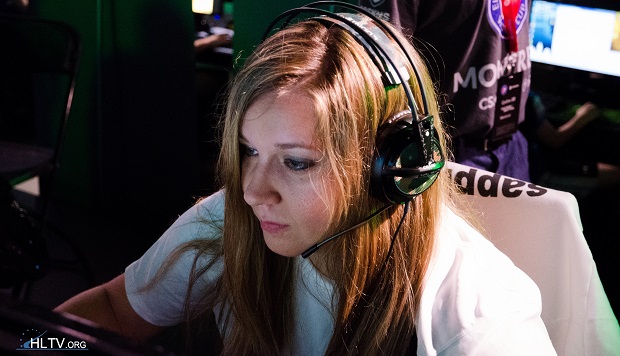
Courtesy of HLTV.org
Heather is a professional CSGO player currently on Team Karma. She’s thirty, lives in Los Angeles and still plays with the same ferocity and determination that she did when she first started playing competitively fifteen years ago. She says, “I truly believe there are a handful of females that could compete on a lower tiered professional team, but this is where misogyny may come into play. I think it’s going to be a while until there is a tier 2 or tier 3 professional team that tries out a female.”
For a lot of women, getting recognised for their abilities can be hard, even when they’re competing and scrimming regularly to great success. CSGO’s best women’s teams are doing pretty damn well considering the vast difference in overall player numbers, with CLG Red sitting at 35th in the GosuGamers rankings (around the same level as teams like LGB eSports, Copenhagen Wolves, and PENTA Sports), but as Heather says, we’ve yet to see a woman join a top tier team in spite of their apparent ability.
I wonder if this is down to a lack of exposure, to some extent. Twitch and other streaming services have been great for the female CSGO scene, in terms of bringing them an audience they didn’t really have before. However, the majority still aren’t being streamed and it’s not always easy to find those that are. I suppose this is in part due to cost and resources. Every stream needs a commentator and technical support, and the viewership hasn’t been proven to be there yet. That’s the dilemma, though - if streams aren’t available or easy to find, how can a viewership assert itself?
Kristen, a full-time Twitch streamer going by the name “KittyPlays”, has played CSGO for a long time - it’s a regular part of her channel. She’s not a pro, but she’s actively doing her best to bring more exposure to other women playing the game and she’s trying to nurture a positive community around it.
“It's not obvious to me how to know when or where to find women's professional competitions on Twitch,” she tells me when I ask her about streaming and the exposure issue. “They often compete in tournaments which are part of the same tournament where men are competing, and the primary Twitch channels for those events or leagues tend to be showing [that part of the] competition, since there is a much larger audience for that.
“If there were a website or a section on Twitch that people know to check for upcoming women's events, to see a broadcast schedule, and to see which women's matches are currently live and on which channels, I think that could make it much easier for people to find women's matches.”
When I ask CLG Red superstar Stephanie “missharvey” Harvey, she says, “I believe the women that actually compete are more focused on playing than promoting their games, and that we need other people to care for them and broadcast them. Unfortunately, there is little-to-no support for female teams and some might say it’s because they need to be better to get that support. I can understand their point, but it goes back to promoting women in the scene to bring more women in.”
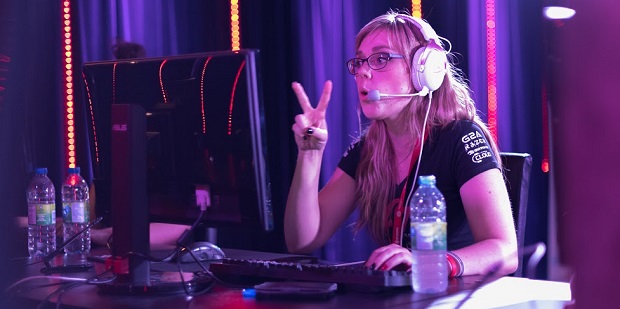
Courtesy of Aurélie Bellacicco Photographie
I believe this is true. Lots of people seem to misunderstand the promotion of women in eSports as women trying to brute-force their way into top tier teams without having the talent or credentials to be there, but that’s not the case. Promoting female players and giving them a stage shows other women that competitive CSGO is a viable career if they’re willing to do the legwork. And some of those women will be able to make it to the top. This gives us an exciting and ever- fluctuating roster of talented, committed pro players to create even better tournaments. And surely that’s what everyone wants, right?
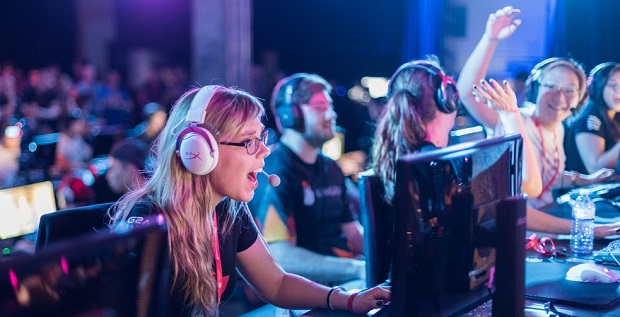
Courtesy of Aurélie Bellacicco Photographie
So I ask Heather and Stephanie what their thoughts on women’s-only events are. After all, these are the events that actively help promote female competitors.
"I think that, as long as there’s disparity in the amount of women competitors in eSports versus the men, women’s events are a really good thing,” Stephanie explains. “People tend to forget that there are very few gender segregated events throughout the year. My team and I actually only participate, on average, in a maximum of three yearly. Three events out of dozens we do, and that's without counting the online leagues we play in almost every night, that are 100% mixed-gender. These female-only events are there for a reason: to provide women with role models they can relate to and identify with. And that's something men can't understand because they have role models already, so they can't relate to our issues.
"I've always been a fierce competitor but it wasn't until I saw Alice Lew, an American ex-pro player, compete at the Female World Cup in 2004 that I got inspired. She inspired me to achieve what she had done and I followed in her footsteps. Today, I believe a lot of women in eSports or in the industry followed mine, and what I can do is battle for these events to stay around until there are more women competing so that they become irrelevant.”
Heather agrees, for the most part: “In moderation, I think women-only events are a good thing. They promote a positive environment for females to compete in and give more amateur women a short-term goal [and] something to aim towards. Events like ESWC and Copenhagen Games give the top women’s teams the opportunity to share the same stage as their male counter-parts. In turn, women considering making the move to competitive play often look up to these female teams, and it pushes them to improve their skills while competing in an environment that may be slightly less intimidating.
“That being said,” she continues, “I stated 'in moderation' because I strongly feel it shouldn’t be the only type of event women compete in. The majority of female teams that compete at the highest female level also test themselves in male-dominated events. My various female teams have played against teams like NiP and Na’Vi on LAN, we’ve entered into the ESL One qualifiers, and constantly play and practice against males in almost 100% of our online matches. I think women-only events are a great stepping stone to showcasing the scene for other women, but shouldn’t be the only thing a female gamer aims for.”
This is something I think a lot of professional CSGO players probably agree with. Exclusively playing women-only tournaments for your whole career would surely be stagnating and counter- intuitive. There’s no clear reason why women can’t compete with and against men.
However, women-only events do give competitors an opportunity to showcase their talents to other teams and inspire young amateur players to consider a career in Counter-Strike. This is important, because women do face bigger barriers than men when entering the scene. Women's tournaments regularly bring in dedicated, supportive fans, sponsors and talent-spotters looking for players, plus some money for those who prove themselves. It’s a positive experience for everyone involved and I honestly don’t think it takes anything away from the larger, mixed-gender tournaments. In fact, this is something I think the Counter-Strike community does really well and should be pretty proud of. Our women’s tournaments are getting bigger and better every year, and I think that’s a good sign. Further down the line, it’s going to improve the competitive scene as a whole.
Maybe we shouldn’t think of women’s tournaments as sitting opposite the major mixed- gender tournaments, but as community-building events. “There are other events that are restricted to corporate- or college-only players, but we don't make a big deal of out it,” says Stephanie. “The goal stays the same: to promote eSports within a community.”
I think this is a fair point. Like competitions for college kids or under 21s, these events encourage and develop the sport within a certain group without ever detracting from the major competitions.
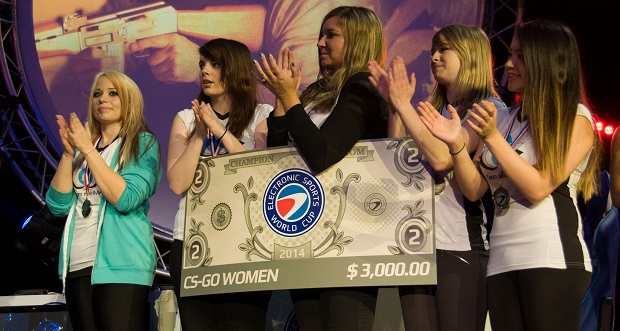
Courtesy of ESWC
If other eSports took after CSGO in this regard, and did as well, I think there would be a big impact on the perception of eSports as a whole, making the scene a more welcoming place for everyone. More diversity means more tolerance, and I think that things would get better for men as well as women and other minorities. It’s something we should work on.
At the moment, though, there are still some obvious problems. “While it doesn’t happen often,” says Heather, “there have been times I’ve been played a mixed tournament on LAN and opponents will call my teammates or me names like “bitch”, among other words I’d not repeat. “Kill that bitch.” “Sit down bitch!” Almost every time, the harasser will come up to us after a match and say “good game” and act like nothing happened.”
It’s frustrating. I don’t think many men realise that using a slur that’s explicitly derogatory toward women is really disheartening. Tell me I’m bad with any other words you want, but bring my gender into it and I just sigh. It’s totally irrelevant and it reduces me to my sex, instead of my skill or personality. “It certainly paints a negative light for other females watching and debating whether or not to compete in the next event,” Heather says.
“I will note, however, that on LAN, a majority of opponents both male and female are incredibly supportive. Famed male teams like Cloud9, Team Liquid and CLG were recently cheering on my team both in person and on Twitter. Many of the professional teams are well aware that the female teams put in just as many hours as they do and respect us for the work we do.
“Online is a much different story in regards to sexual harassment. Generally the professional teams are incredibly supportive but amateur male teams or players can be incredibly abusive, so it’s no wonder why some females feel safer playing in women-only events.”
Stephanie concurs with this perception. “There’s this whole internet world where anonymity is everywhere and it allows people to have little-to-no thought behind their actions. This can quickly provide a toxic environment for a minority to be in, which causes women in eSports to often be victims of their passion. That might have been the hardest part for me. Being a woman brought a lot of attention to me in gaming and a lot of it wasn't in a good way. I had to learn to love myself for who I am, ignore the negativity, focus on my goals and desires, weigh everything to make sure it was worth it, etc. I still struggle today to be a complete shield against it all but I keep working towards my serenity.”
I ask if it ever feels like these trolls outweigh the good-natured, supportive fans who really care about the game. “I'm actually not sure if they outweigh the fans, but I do know they are the most vocal ones and the ones that affect you the longest. It does bother me, but I unfortunately got used to it over time. I believe no one should get used to insults and harassment, but I think I had to so I could be where I am today. Thing is, sometimes I still stand up and denounce these trolls, but I pick my fights. I'm never gonna be okay with it but I can make statements when it will make the most impact to our community.”
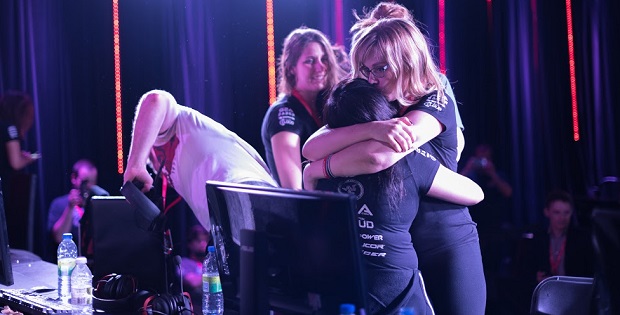
Courtesy of Aurélie Bellacicco Photographie
Stephanie is doing her best to counter the abuse problem in her own way. She’s an online ambassador for the charity CyberSmile, an anti-cyberbullying organisation, and she’s doing whatever she can to support their efforts. “I’m trying to make the world a better place by fighting cyberbullying and helping the victims of it. It's one of society's biggest problems as technology and social media are at the heart of our social interactions. ‘Raise awareness to fight the trolls’ is my motto.”
Even still, it’s a struggle for Stephanie to continuously fight the negativity. I ask Heather if it’s the same for her - if she ever struggles to speak out for fear of further negative attention. “Yes,” she says. “I don’t like to be the one that ‘rocks the boat’. For years, I’ve elected to just ignore it but I’m starting to come to the realisation that very few people are speaking out. As someone more experienced in the community, I almost feel it is my duty to help address issues that I dealt with for over a decade so that the younger generation can compete in a more welcoming world. That being said, it’s difficult to know where to begin.”
Kristen, for her part, is still passionate and optimistic in her drive to develop a positive community. “My approach is not to engage people behaving badly, or to try to correct or punish them for it, but to simply respond positively to those people who are being kind and supportive.” She says, “I believe everyone can be, and I hope the people typing toxic things will see they get a better response when they are kind and supportive, and I try to give them an opportunity to do that.”
Being a professional Counter-Strike player requires a huge amount of passion and dedication. We should be proud of the people who are competing and we should endeavour to make eSports a better space for them to work in. Both male and female competitors have to put in an incredible amount of work to get anywhere near the top, but with such a small pool of female players to begin with, I feel like we need to work on how we cut through the intolerance and ignorance so that we can encourage more women to play the game and go professional.
“I’ve had to give up a lot in life to get where I am,” Heather tells me, “and I’m still nowhere near where I want to be. I skipped out on many parties in college, missed family get-togethers and even holidays, stopped playing varsity sports and couldn’t find time to go to the gym, among many other things. Just like a professional athlete, it takes an enormous amount of time and dedication to be a competitive player, which means making sacrifices elsewhere. I wouldn’t blame other female gamers for not wanting to make sacrifices in exchange for practicing.”
There are honestly lots of barriers for anyone that wants to become a professional gamer, not only for women,” says Stephanie. “It’s still a risky profession as we have no idea how it will develop over the years.”
When I ask Stephanie what her advice for other players wanting to turn professional would be she says, “Never give up. And work as hard as you can to reach your goal while maintaining a balanced life. Your health, education, friends and family, etc. It all matters and, in the end, you need it all to be happy.”
A Counter-Strike career, whether for men or women, can be a great journey. For Heather, it started in Milwaukee, Wisconsin, with the original CS still in beta. She and her brother would have LAN parties in their parents basement.
“My brother and I convinced my parents to go to Dallas for a major international tournament,” She recalls. “My mom and Grandma drove us sixteen hours south. We hung out in the BYOC and felt an enormous sense of patriotism cheering on American team X3 in the CPL event. The team included moto and Ksharp; the former who ended being my brother’s team manager later in life and the latter being one of our closest friends. However, at the time, they were celebrities and heroes in our eyes.
“We wanted to share that same stage and both set our eyes on improving our skill. My brother, friends and I would travel the country every few months to compete in an event and get our names our there.
“As of today, I’ve competed in nearly two hundred LAN tournaments in addition to numerous online leagues. My crowning achievement was winning a CS:GO World Championship in the ESWC Female 2012 event. However, I’ve only competed in a handful of female-only events. Instead, I’ve competed against players of all skill levels across the world, male or female, in my fifteen years of competitive Counter-Strike. I’ve competed against everyone from a group of local middle schoolers to legends like NiP, Na’Vi, Team3D, Dynamic and PowersGaming. In addition to competing, I’ve also found myself on the business side of eSports. I’ve worked as a journalist, managing editor, public relations manager, social media guru and league admin among many other titles with some of the world’s most reputable organisations.”
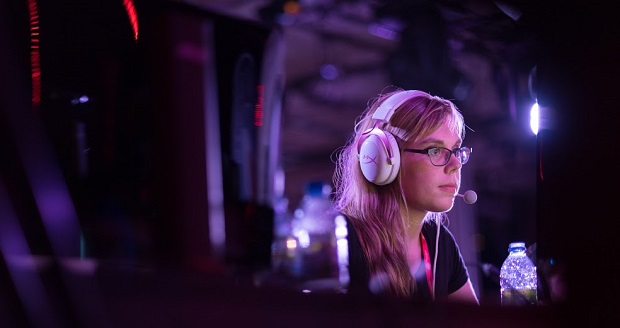
Courtesy of Aurélie Bellacicco Photographie
For Stephanie, it started with a guy she liked and a special lunch deal at the local LAN centre - $5 for poutine and 45 minutes of CS. “Eventually I went to the prom with him but that was it,” she says, “he wasn't really interested. I never quit Counter-Strike, though, and stayed friends with the local players.”
Now she plays professionally for CLG Red and is a game designer at Ubisoft Montreal. “I’ve been involved in eSports for over 12 years, winning five Counter-Strike Female World Championships along the way. I’ve also been in the video game industry as a developer for the past seven years and was one of the 2014 Forbes 30 Under 30 Game Changers.”
However, that’s about to change. “I’m looking forward to the sabbatical I’m taking from game design in the next few months to focus 100% on eSports, CS and CLG Red. Even though I have an amazing career, I want to pursue this passion of mine and I’m currently too busy with both to feel like I’m accomplishing it well. This year, I will finally take the leap to see if I can find peace with it or continue in eSports for more time. I love my game design job, and this decision wasn't taken lightly, but I believe it is the right one.”
To those women considering a life in professional CSGO, Heather says, “Try your best not to let [the abuse] hurt you. I’ve been called every name in the book and if I told my colleagues, family or non-gamer friends they’d be shocked. Don’t let it stop you from achieving your goals. Competing in Counter-Strike and winning a major event is one of the most rewarding feelings I’ve ever had and I’d never trade my experiences for anything.
"It takes time, patience and money to travel and compete but it’s so worth it. I’ve met some incredible people through gaming that will be lifelong friends. Keep practicing. Find a group of friends you enjoy playing with, because succeeding will be even more rewarding if its done alongside people you care about.”





